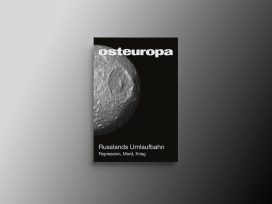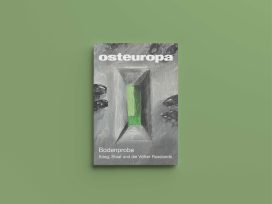Abstracts Osteuropa 7/2006
Micha Brumlik
Love those far removed. Chechnya, Tolstoi, and the world community
In terms of method, cruelty, scope, and intensity, the Russian Army’s operations against the Chechen civilian population have exceeded what could be proved against Slobodan Milosevic in the Hague. Yet the international community is silent when it comes to this war – a war reminiscent of genocide. This will not astonish those versed in the enlightened thinking of cynical realpolitik. If people in a globalized world want to survive and stand by one another, they need a number of responsibilities. The most important of these is “love those far removed” (as opposed to “love thy neighbour”), which Nietzsche first proposed and Lev Tolstoi realized in Hadzhi Murat in the setting of Chechnya.
Uwe Halbach
Precarious statehood. Structural problems in the northern Caucasus
When it comes to the challenges facing the internal and external security of post-Soviet Russia, no other part of its territory stands out as much as the northern Caucasus. Even in President Vladimir Putin’s second term, in which a process of re-centralization was carried out, the belt of semirepublics in the Caucasus remains the unstable “domestic overseas” of Russia. The violence and perilous conditions on Russia’s southern periphery are hardly limited to Chechnya alone.
Jeronim Perovic
On the brink. An undesirable trend in the northern Caucasus
In Chechnya, large-scale military operations are no longer underway. Moscow has noticeably reduced its troops there. Nonetheless, the situation remains tense. While Moscow is transferring responsibility to local authorities in Chechnya, it is betting on centralized control and a stronger military presence in the rest of the Caucasus. Both approaches are problematic. Russia’s withdrawal from Chechnya could bring in its wake greater risk of an inner-Chechen conflict. Its conspicuous appearance as a police power in the other republics of the northern Caucasus could upset the delicate balance in the region and promote the growth of Islamist rebel groups.
Aleksandr Proskuryakov
Chechen diffusion. Conflicts, struggles, and warriors in the northern Caucasus
Chechnya is where the conflict zones of the northern Caucasus and southern Caucasus meet. Although Russia’s president, Vladimir Putin, has declared the war in Chechnya to be over, the fighting is spreading surreptitiously. The proximity and interconnection of the zones of conflict and outbreaks of violence facilitate this spread. Dagestan is especially affected. This more recent development gives rise to concerns that the northern Caucasus’s other national republics will become staging grounds for a spiral of violence of terror attacks by radical separatists and Russian special forces.
Margarete Wiest
Limited pluralism. Post-communist authoritarian systems
In transformation research, the concept of authoritarianism is neglected. Setting authoritarian systems apart from those that are democratic and totalitarian was long considered desideratum. Limited pluralism can be understood as a central characteristic of authoritarian systems. For some time, interest in this subject has been growing. This is seen in the various forms of authoritarianisms with adjectives created to capture the peculiarities of post-communist authoritarian systems. The features of authoritarianisms in the ex-communist realm include insufficient rule of law, inefficient state structures, and incestuous relations between politics and the business world.
Gerhard Simon
Changing authoritarian systems. Post-communist people’s movements for democracy
In several authoritarian-conceived post-communist states, people’s movements were established that challenged those in power and demanded a transformation of those authoritarian regimes into democratic orders. A comparative analysis of developments in Serbia, Ukraine, Georgia, and Kyrgyzstan, where people’s movements forced a change in regime or were partially successful, as well as a contrasting look at the failed initiatives in Azerbaijan and Belarus, reveal the preconditions under which democratic change is possible. What is required are organizational experience in the opposition, division within the ruling elites, a clearly defined and limited goal, mass mobilization, and lack of violence.
Tomas Lebeda
Stalemate in ventral Europe. The 2006 Czech parlimentary election
The parliamentary election in the Czech Republic in early June 2006 led to a stalemate. The former centre-left coalition has fallen apart and is no longer capable of governing. A coalition of communists and social democrats lacks a majority. And even the centre-right alliance of liberals, conservatives, Christian socialists, and Greens that sought to build a coalition after the election has been unable to reach an agreement on sharing power. Czech politics is still blocked two months after the election.
Freddy Litten
The Cold War on microform. The Bavarian State Library’s eastern European archival holdings
The Bavarian State Library in Munich has an extensive collection of microfilmed archival records from and about eastern Europe. Materials about the Cold War from Russian, American, and British archives are among the most important materials. Not only are the political tensions between the superpowers – the United States and the Soviet Union – documented, but also the political, social, and economic background in eastern and central eastern Europe as well as global aspects of the confrontation between the two blocs.
Published 30 July 2006
Original in German
Contributed by Osteuropa © Osteuropa
PDF/PRINTNewsletter
Subscribe to know what’s worth thinking about.



